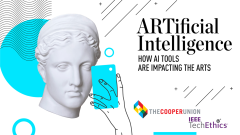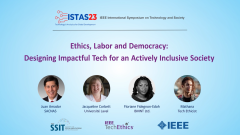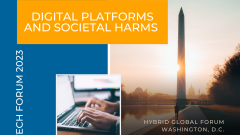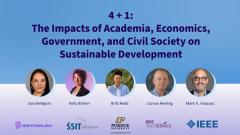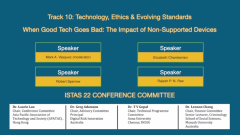Health & Human Well-Being | Session 2: Ethical, Legal & Policy Considerations | IEEE TechEthics & UN-DESA
About the Video: This session features an expert panel addressing some of the key considerations of new and emerging technologies for health and human well-being, followed by a Q&A session.
About the Event: "New Technologies, Ethics and Policy Engagement for Sustainable Development" is a new series of online events conceived by IEEE TechEthics and the UN Department of Economic & Social Affairs (UN-DESA) as a way to facilitate and share technology solutions and promote substantive discussions among policymakers, engineers, legal experts, ethicists, social scientists, and others on a variety of topics related to the Sustainable Development Goals. This event in the series focused on Health & Human Well-Being.
About the Speakers:
- As the coordinator of the Fiocruz Strategy for the 2030 Agenda, Paulo Gadelha is in charge of promoting Fiocruz’s strategic engagement with the Agenda’s aspirational principles and goals. His background in technology includes studies of the application of technology in public health, healthcare models, and the history of Science, Technology & Innovation. Paulo was Fiocruz President from 2009 to 2016, leading scientific achievements in biomedical sciences, the generation of scientific and technological knowledge, and the promotion of health and social development. Previously, he founded and directed the “Casa de Oswaldo Cruz”, a Fiocruz Institute dedicated to the sociology and history of science and health. Paulo served as a member of the National Health Council’s Science and Technology Intersectoral Commission. As President of the Brazilian Association of Collective Health, he chaired the 11th World Congress on Public Health. In cooperation with UN/DESA, he headed Fiocruz’s efforts in organizing the 1st International Consultation on Science, Technology and Innovation in the implementation of the 2030 Agenda and its health-related goals in 2017.
- Henry T. (Hank) Greely is the Deane F. and Kate Edelman Johnson Professor of Law; Professor, by courtesy, of Genetics; and Director of the Center for Law and the Biosciences at Stanford University. He specializes in ethical, legal, and social issues arising from the biosciences. He is a founder and immediate past President of the International Neuroethics Society; chairs the California Advisory Committee on Human Stem Cell Research; chairs the Ethical, Legal, and Social Issues Committee of the Earth BioGenome Project; and currently serves on two National Academy of Sciences Committees, one on Developing a Research Agenda and Research Governance Approaches for Climate Intervention Strategies that Reflect Sunlight to Cool Earth and the second on Ethical, Legal, and Regulatory Issues Associated with Neural Chimeras and Organoids. He serves on the NIH BRAIN Initiative’s Multi-Council Working Group and co-chairs the Initiative’s Neuroethics Work Group. He published THE END OF SEX AND THE FUTURE OF HUMAN REPRODUCTION in 2016. His next book, CRISPR PEOPLE: THE SCIENCE AND ETHICS OF EDITING HUMANS, will be published in February 2021. Professor Greely graduated from Stanford in 1974 and Yale Law School in 1977. He served as a law clerk for Judge John Minor Wisdom on the United States Court of Appeals for the Fifth Circuit and Justice Potter Stewart of the United States Supreme Court. After working during the Carter Administration in the Departments of Defense and Energy, he entered private law practice in Los Angeles in 1981. He joined the Stanford faculty in 1985.
- Andrea Grimes Parker is an Associate Professor in the School of Interactive Computing at the Georgia Institute of Technology (Georgia Tech). She is also an Adjunct Associate Professor in the Rollins School of Public Health at Emory University. Dr. Parker holds a Ph.D. in Human-Centered Computing from Georgia Tech and a B.S. in Computer Science from Northeastern University. From 2018-2019, she was a Northeastern University Institute of Health Equity and Social Justice Research Faculty Scholar. Dr. Parker is the founder and director of the Wellness Technology Research Lab at Georgia Tech. Her interdisciplinary research spans the domains of human-computer interaction (HCI) and public health, as she examines how social and interactive computing systems can be designed to address health disparities. Dr. Parker’s research has been funded through awards from the National Science Foundation, the National Institutes of Health, the Aetna Foundation, and Google. She serves as co-chair for the Workgroup on Interactive Systems in Healthcare (WISH), and is a member of the Georgia Maternal Health Research for Action Steering Committee and the Association of Computing Machinery’s Steering Committee on Computer-Supported Cooperative Work & Social Computing. Dr. Parker has received several best paper nominations for her research on health equity.
- Mark A. Vasquez (moderator) is a Certified Association Executive (CAE) with over 25 years of experience in association management at IEEE. He currently serves as the program manager for IEEE TechEthics, a program that drives conversations about the ethical and societal impacts of technology. In this capacity, he works to develop relationships with others in the technology ethics community, produces events, convenes thought leaders, and more. Mark is an engineering graduate of The Cooper Union.
Recorded on 17 December 2020.
About the Video: This session features an expert panel addressing some of the key considerations of new and emerging technologies for health and human well-being, followed by a Q&A session.
 Cart
Cart Create Account
Create Account Sign In
Sign In

